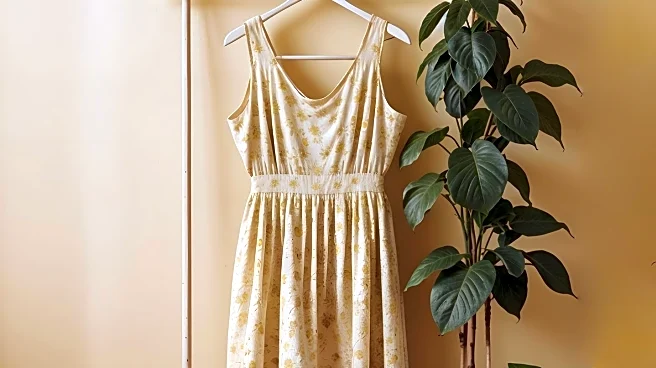What's Happening?
A viral trend has emerged involving a fake Anthropologie rock, which has captivated internet users. The trend began when content creator Phoebe Adams posted a video on TikTok, claiming she purchased a plain rock from Anthropologie for $150. This prank led to a series of similar videos where individuals pretended to buy expensive rocks from the store, fooling their partners. The trend gained traction due to Anthropologie's reputation for selling high-priced home decor items, making the prank believable. Anthropologie responded by embracing the joke, creating a mock display of rocks in one of their stores for a video, although they clarified they are not actually selling rocks.
Why It's Important?
The prank highlights the power of social media in shaping consumer perceptions and brand interactions. Anthropologie's playful response to the trend demonstrates how companies can leverage viral moments for marketing purposes, potentially enhancing brand visibility and engagement. This incident underscores the influence of online platforms in driving cultural phenomena and the importance of adaptability in corporate communication strategies. The trend also reflects societal attitudes towards consumerism and the humor found in questioning the value of luxury goods.
What's Next?
While Anthropologie has not announced plans to sell rocks, the trend may inspire other brands to consider unconventional marketing strategies that capitalize on viral content. Companies might explore collaborations with influencers to create engaging campaigns that resonate with online audiences. Additionally, the trend could prompt discussions about the role of humor in marketing and the potential for social media to redefine brand narratives. As the prank continues to circulate, it may lead to further creative expressions and adaptations by other content creators.
Beyond the Headlines
The prank raises questions about consumer culture and the perceived value of goods. It challenges the notion of luxury and prompts reflection on the ethics of marketing high-priced items. The trend also highlights the role of humor in social media, serving as a tool for critique and entertainment. This phenomenon may influence future marketing strategies, encouraging brands to embrace humor and authenticity in their communications.








